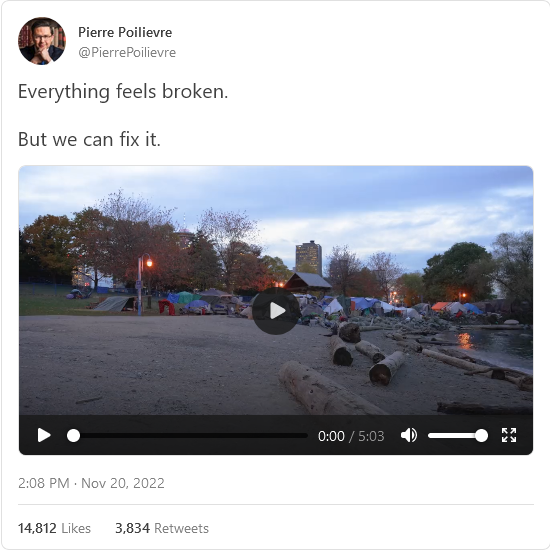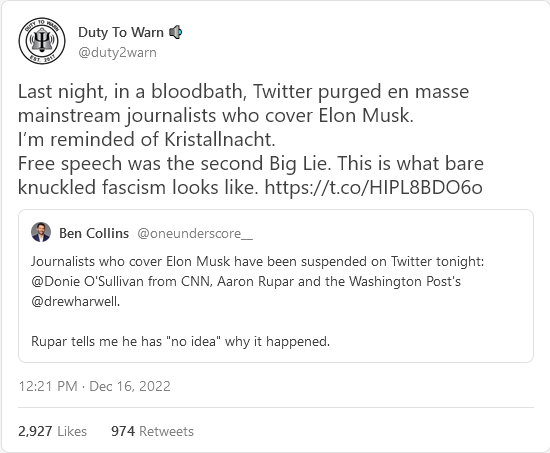In the free-to-cheapskates exerpt from this week’s Dispatch from The Line, they set up the possible lines of attack for the next federal election:
What was more interesting to us this week were the comments made by Prime Minister Justin Trudeau to thousands of Liberals at a large in-person Christmas party. As one does at any good Christmas party, the PM took the chance to, uh, savage his rivals. To wit: “Canada is not broken … Mr. Poilievre might choose to undermine our democracy by amplifying conspiracy theories. He might decide to run away from journalists when they ask him tough questions. That’s how he brands himself. That’s his choice. But, when he says that Canada is broken, that’s where we draw the line.” (Full video of the speech is available via CTV News).
The PM was responding, of course, to a recent line of attack favoured by the Conservatives: that Canada is broken, and we need the Conservatives to fix it.
There are three comments we’ll make in response to this.
The first is strictly an analysis: Trudeau is staking out some interesting rhetorical ground. We aren’t sure this will be the ground on which the next campaign is fought over — God only knows what’ll happen between now and whenever we are next headed to the polls. But if this is the subject of our next “ballot question”, well, that’s just fascinating. “Sunny Ways” vs. “Everything Is Broken and It’s Your Fault.”
How fun! Both men would be able to make an honest pitch for their case. As we’ve written before, the Liberals seem exhausted and spent. They’ve accumulated baggage since their first smiley-faced win back in 2015, and the country has been thoroughly battered by events since then. That suggests that Poilievre, who is at his best when on the attack, could mop the floor with Trudeau.
That said, we don’t take that outcome as a given. First, Trudeau is a damned good politician, better than the Conservatives still give him credit for, and though we are starting to wonder if Trudeau is past the point of no return, we will never count him out. We also think that if the Conservatives make “Things are terrible” the centrepiece of their next campaign, may find that Canadians recoil. Canadian pride is a fragile, brittle thing, and while many of us may feel like things are bad, it’s not clear to us that Poilievre saying so won’t rub a lot of voters the wrong way.
But we honestly don’t know. That’s why it’s fascinating.
The second point is a bit of a reminder: It is worth noting that the major promoter of the “Canada is broken” thesis over the past few years has been … Justin Trudeau. We don’t think we — your Line editors, the media, Canadians in general — should let him take such casual re-occupation of the “Sunny Ways” position, since he’s spent the last five years absolutely dumping on Canada, its history (genocide), its symbols (the flag), and its institutions (the military, amongst others). No one has done more to proclaim Canada broken than Justin Trudeau. Is he now claiming that he’s fixed all the problems he’s spent the last half decade making political hay over?
We mean … the guy won’t even fix his house.
The third point is our own view: of course Canada is broken. And Trudeau has done nothing to fix it.
Now, we have to define our terms here. “Broken” isn’t “destroyed”. We don’t think we’re descending into some kind of post-apocalyptic wasteland. It remains undeniably true that Canada is, in global terms, a nice place to live. Safe. Lots of food. No one is firing missiles at us. Sweet! But, like, gosh, folks. Look around. If the PM really wants to assert that Canada isn’t broken, we’ll agree insofar as it’s not so broken that the average person fears starvation and violent death. Sure. But that average person also probably can’t get a passport, or a family doctor, or timely care in an emergency room, or a house in a big city where the jobs are clustering, or Tylenol for their kids.






